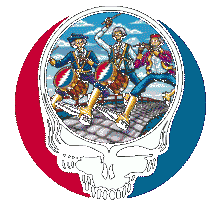Barlow Debate


From the Herald News:
Sharing or swiping?
Will Richmond, Herald News Staff Reporter
DARTMOUTH -- Pirates may normally be associated with the sea, but thanks to the record industry the crusty, eye-patched lawbreakers have moved behind computers.
At least that’s the image former Grateful Dead lyricist John Perry Barlow said the record industry wants to portray in those who conduct in free file-sharing on the Internet.
Barlow went one-on-one Monday night with National Association of Record Industry Professionals President Tess Taylor at the University of Massachusetts Dartmouth to debate the issue of music piracy."A pirate is someone who overtakes a vessel on the high seas ... and I’ve looked at some dictionaries and the definitions don’t deviate much from that," Barlow said.
"Taking that word and applying it to the sharing of music is something I’ve got to give the recording industry credit for."Taylor, who spoke against the concept of free file-sharing, said the inception of programs such as Napster have had a negative effect on the recording industry, causing thousands of lost jobs and the "overall poor health of the record industry."
In contrast, Barlow argued for free file-sharing, saying the concept has helped many musicians make more money by generating interest in attending live performances, which is the big money-maker.
He pointed to the Grateful Dead and the band’s decision to allow people to record their concerts as an example of how music sharing is beneficial. Barlow noted that, despite the free system of sharing the recorded concerts, many of the Grateful Dead’s albums went on to become platinum sellers, while at the same time the group became the highest-grossing concert group in the United States.
"Sharing information is a basic human function," Barlow said.
Taylor contended file-sharing takes money from the music industry and puts it into the pockets of those who provide the sharing services.
"Free music just means someone other than the creator (of the music) is making the money," Taylor said.
While she voiced her opposition to file-sharing, Taylor also acknowledged it can be beneficial for new music acts entering the scene as a way to generate interest, but eventually those bands need to sell compact discs to make money.
Barlow pointed to the acts themselves as the reason for the industry’s declining health, not the proliferation of free music."The reason for the decline ... is the steady stream of crap," Barlow said. "When you’re selling crap it’s hard to get as much (money) as before."
Taylor argued that because people are getting their music for free, no one is rushing to record stores.
"I see so much file-sharing that people aren’t induced to go out and buy CDs," Taylor said.
She also noted that the industry has mixed feelings about services such as Apple Computer’s iTunes Music Store, which charges a 99-cent per-song fee. Taylor said she doesn’t agree all music should be the same price because it cheapens good music, but added pay systems have opened up a new method to music sales."I’m delighted there’s a new channel, a new revenue stream that opens people up to music," Taylor said.
E-mail Will Richmond at wrichmond@heraldnews.com.



0 Comments:
Post a Comment
<< Home